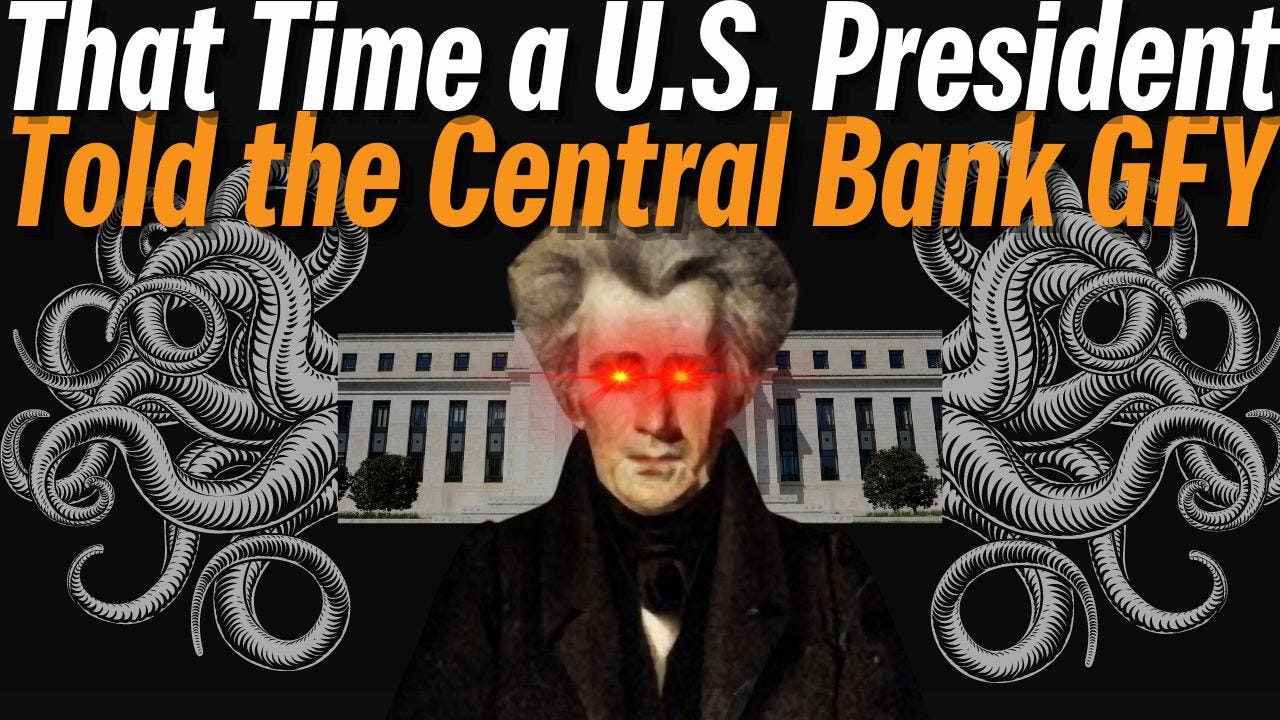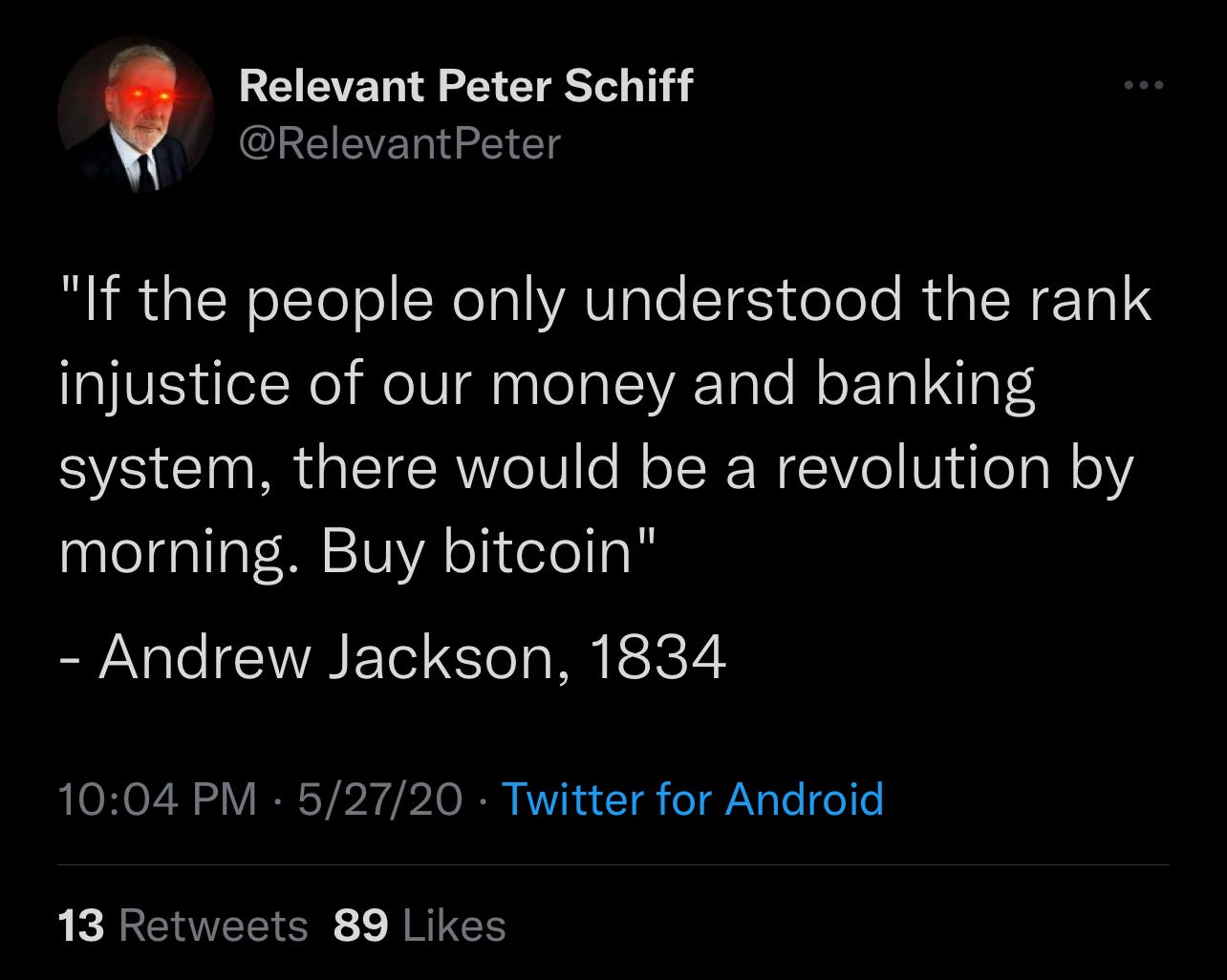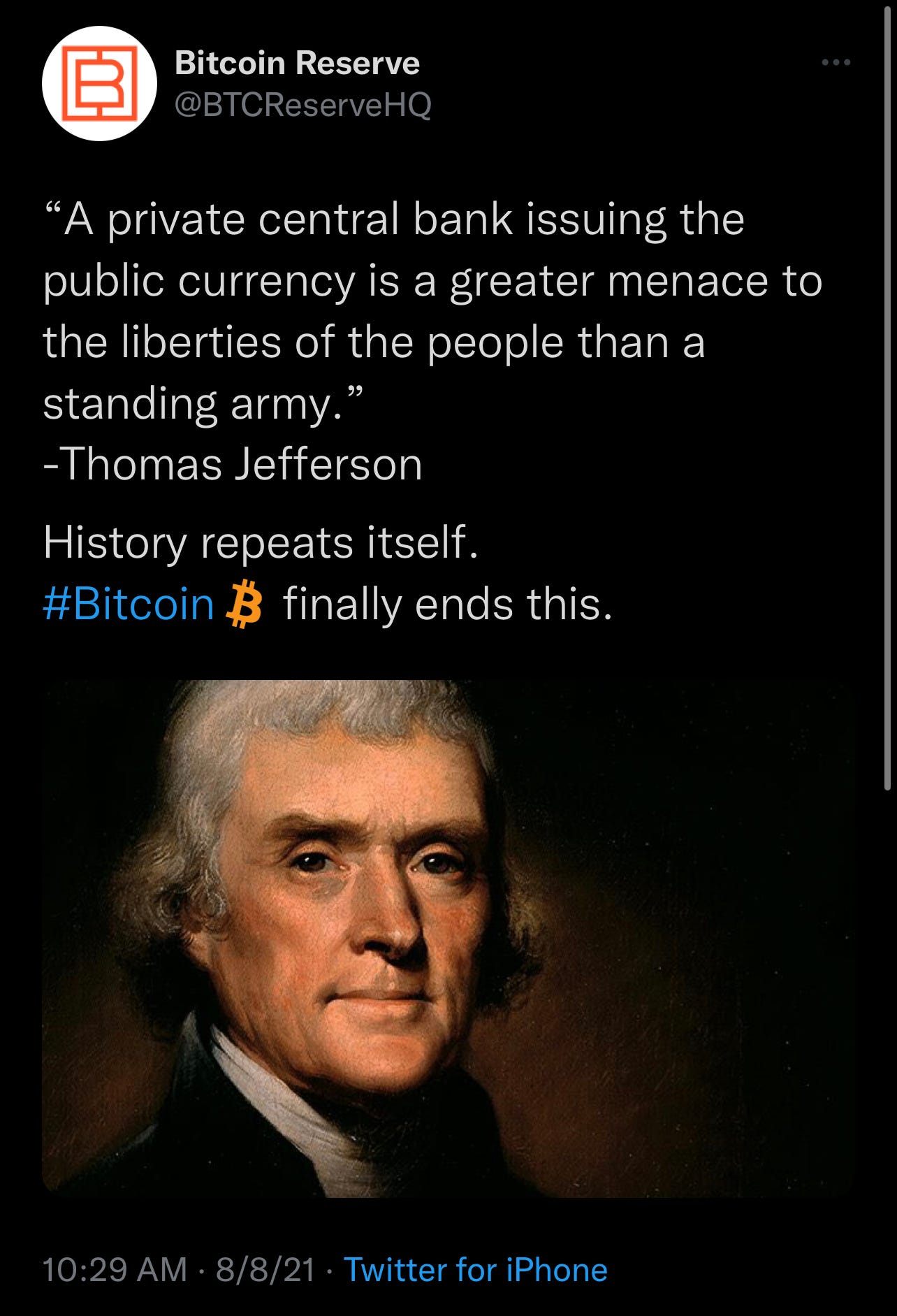After witnessing the recent and growing spread of the vicious virus of tyranny on a global scale, it's almost hard to remember; it didn't use to be like this.
At one time, strong men were leaders who stood on principle and did what they thought would preserve the integrity and liberty of the people they represented. We have come a long way since the based Andrew Jackson told the central bank in tl;dr format to go fuck themselves.
Can you imagine a modern President taking on the Fed?
Andrew Jackson's 1832 maneuver was iconic and historical. In the early 19th century, the Bank of the United States became the nation's first central bank. Andrew Jackson promised to diminish the bank of the United States control over the economy in 1829. Jackson called the bank a "hydra-headed monster" that eroded American moral standards, contaminated political leaders, and threatened our freedom, bought dozens of congressmen and tried to destroy our democracy.
Bitcoiners, Free-Market, and Austrian Economists share this same view of the FED and centralized institutions today
In the election year of 1832, the bank president, working with Congressmen Henry Clay and Daniel Webster, requested an extension on their 20-year charter. They believed that Jackson wouldn't jeopardize his reelection by utilizing the presidential veto if Congress approved it.
They screwed the pooch on that one. The banking establishment learned the hard way, don't underestimate "Old Hickory."
Jackson laid it down forcefully and poetically in his veto of the bank's charter for the following reasons.
It was a financially dominant entity that was dangerously centralized.
It rendered the economy vulnerable to foreign and special interests.
It had too much power over federal lawmakers.
It favored the North (where most financial centers were situated) over the South and West.
It possessed an unconstitutional monopoly on finance that only helped the rich get richer at the expense of the Plebs.
All of these criticisms still apply to the Federal Reserve System of
today.
Jackson's detractors believed that the veto would end Jackson's political career. But, once again, their predictions were incorrect since most voters supported him, and he was re-elected with little difficulty.
Emboldened by his triumph, Jackson sent orders to the Treasury to withdraw government monies from the bank. As a result, the bank failed without the cash required to give out favors. Within a few short years, the bank succumbed to its inability to obtain funds from the federal government.
Through the 1840s and 1850s, President Andrew Jackson's triumph over the Bank of the United States decentralized the economy, which resulted in increased economic prosperity and individual freedom.
Breaking Down Old Hickory's Middle Finger to the Central Bank and How the Bitcoin Standard can Return America to its Roots
Jackson adhered to Thomas Jefferson's rigorous understanding of the Constitution.
The power to establish a bank was not delegated to Congress by the Constitution. However, the idea that Congress had the authority to establish a bank was the impetus behind Alexander Hamilton's formulation of the "implied powers" doctrine.
According to this theory, Congress possessed the authority to do anything "necessary and proper" (Article 1, Section 8) to fulfill its fiscal responsibilities. Jackson disagreed with this viewpoint and believed that Congress did not possess a specific power if the Constitution did not expressly grant that authority to it clearly and unequivocally.
The fact that the National Bank did not have to answer to anybody else in government breaches the system of checks and balances. In addition, it had a dominant position in the financial sector
Jackson Excerpt on Unconstitutionality of the Bank: “It cannot be necessary to the character of the Bank as a fiscal agent of the Government that its private business should be exempted from that taxation to which all the State banks are liable; nor can I conceive it proper that the substantive and most essential powers reserved by the States shall be thus attacked and annihilated as a means of executing the powers delegated to the general government. It may be safely assumed that none of those sages who had an agency in forming or adopting our Constitution, ever imagined that any portion of the taxing power of the States, not prohibited to them nor delegated to Congress, was to be swept away and annihilated as a means of executing certain powers delegated to Congress….
Suspicions are entertained, and charges are made, of gross abuse and violation of its charter. An investigation unwillingly conceded, and so restricted in time as necessarily to make it incomplete and unsatisfactory, disclosed enough to excite suspicion and alarm. In the practices of the principal bank partially unveiled, in the absence of important witnesses, and in numerous charges confidently made, and as yet wholly uninvestigated, there was enough to induce a majority of the committee of investigation, a committee which was selected from the most able and honorable members of the House of Representatives, to recommend a suspension of further action upon the bill, and a prosecution of the inquiry. As the charter had yet four years to run, and as a renewal now was not necessary to the successful prosecution of its business, it was to have been expected that the Bank itself, conscious of its purity, and proud of its character, would have withdrawn its application for the present, and demanded the severest scrutiny into all its transactions. In their declining to do so, there seems to be an additional reason why the functionaries of the Government should proceed with less haste and more caution in the renewal of their monopoly….
I have now done my duty to my country. If sustained by my fellow citizens, I shall be grateful and happy; if not, I shall find in the motives which impel me ample grounds for contentment and peace. In the difficulties which surround us and the dangers which threaten our institutions there is cause for neither dismay nor alarm. For relief and deliverance let us firmly rely on that kind Providence which, I am sure, watches with peculiar care over the destinies of our republic, and on the intelligence and wisdom of our countrymen. Through His abundant goodness, and their patriotic devotion, our liberty and Union will be preserved.”
Central Bank Relinquishes National Sovereignty to Foreign Control
Jackson also mentioned that the National Bank left the United States government vulnerable to being controlled by foreign interests. He pointed out that more than a quarter of the National Bank's owners were from other countries. He argued that it discriminates against the entirety of the American population and disregards their viewpoints. In practice, this goes against a government based on equality, honesty, and justice because only a select few individuals from privileged groups and foreign countries own the shares for the bank.
Most of the bank's control was held by investors from other countries and the Bank of England. By demanding interest payments from customers who used their paper American money, these outside investors made a significant profit from the National Bank. By increasing the money supply and imposing interest fees on its use, the United States Bank quickly put the American people in a position of growing debt. The obligation to repay this debt fell squarely on the shoulders of the American people. The National Bank was a dishonest organization that served the interests of foreign investors while placing the financial burden of debt on the American people.
He could see the fundamental abuse of power that the United States Bank was committing. In the note accompanying his veto, he outlined several apparent reasons why the National Bank should not be rechartered. Jackson presented evidence that the bank violated the Constitution, served as a monopoly for the wealthy and left the nation vulnerable to the influence of foreign interests.
Jackson on Central Bank Being under Foreign Interest: “But if any private citizen or public functionary should interpose to curtail its powers, or prevent a renewal of its privileges, it cannot be doubted that he would be made to feel its influence.
Should the stock of the Bank principally pass into the hands of the subjects of a foreign country, and we should unfortunately become involved in a war with that country, what would be our condition? Of the course which would be pursued by a bank almost wholly owned by the subjects of a foreign power, and managed by those whose interests, if not affections, would run in the same direction, there can be no doubt. All its operations within would be in aid of the hostile fleets and armies without. Controlling our currency, receiving our public moneys, and holding thousands of our citizens in dependence, it would be more formidable and dangerous than the naval and military power of the enemy….”
Jackson's veto letter appealed to commoners and attacked the elite
In his statement explaining his veto, President Jackson directed most of his comments toward average Americans while targeting the elites. Jackson issued a stern warning that the concepts of the measure ran counter to the values of Republican equality and that the bill violated these beliefs. He was under the impression that the bank was a shady establishment that catered to the well-to-do and gave people with riches an advantage in the political sphere. Jackson advocated for equitable access to opportunities and contended that the bank fostered special privilege, monopoly for the wealthy, and a perilously high degree of inequality.
He observed that the bulk of the shareholders comprised a select group of wealthy upper-class individuals. He felt sorry for the maltreated farmers, mechanics, and laborers and stood in solidarity with them. Jackson's history had a factor in his decision to veto this bill. Because he spent his childhood in the rural areas of Tennessee under the care of his aunt, he was familiar with the working-class lifestyle. His life experiences shaped his opinion that the Central Bank was a monopoly for the wealthy, and as a result, he exercised his veto power against the measure.
Unjustness of the National Bank and Cantillon Benefits: “To acknowledge its force is to admit that the Bank ought to be perpetual; and, as a consequence, the present stockholders, and those inheriting their rights as successors, be established a privileged order, clothed both with great political power and enjoying immense pecuniary advantages from their connection with the Government. The modifications of the existing charter, proposed by this act, are not such, in my views, as make it consistent with the rights of the States or the liberties of the people.
Is there no danger to our liberty and independence in a Bank that in its nature has so little to bind it to our country. The president of the Bank has told us that most of the State banks exist by its forbearance. Should its influence become concentered, as it may under the operation of such an act as this, in the hands of a self-elected directory, whose interests are identified with those of the foreign stockholders, will there not be cause to tremble for the purity of our elections in peace, and for the independence of our country in war. Their power would be great whenever they might choose to exert it; but if this monopoly were regularly renewed every fifteen or twenty years, on terms proposed by themselves, they might seldom in peace put forth their strength to influence elections or control the affairs of the nation.”
Based ‘Old Hickory’ was a Bitcoiner
Jackson lived a gigantic life, but like many Plebs, he was an underdog that had to overcome adversity and attacked life with tenacity.
Jackson's father died before he was born in 1767, but he held a desire to fight tyranny at a young age growing up in revolutionary era South Carolina. He joined the cause at the age of 13 with his brothers. His older brother died in 1779 following the Battle of Stono Ferry. Jackson and his brother were POWs two years later, and while captive, a British soldier slashed young Jackson with his sword after he refused to spit-shine a Torie soldier's boots. Jackson and his brother contracted smallpox while in custody before they were free via a prisoner exchange. Not long after, Jackson's brother Robert died from the disease.
The to-be president recovered, but his mother died after coming down with an illness tending to wounded and sick soldiers. Jackson was an orphan at the age of 14.
Despite all this, the man became a mostly self-taught attorney, judge, a war hero, and President. Like the Plebs, he never backed down to a duel and stood on his principles. He fought the media of the time, the state, and most importantly, the Central Bank.
Despite the constant attacks, he was adored by the people and threw arguably the biggest rager in United States history at his first inauguration. Everyone from every walk of life came to the White House to celebrate his election; the shin-dig was so lit that they had to renovate the White House after; it was like "The Hangover" but in 1829.
Bitcoiners like Jackson stand against the centralized unelected monopoly that is the Central Bank. Like Jackson, Bitcoiners understand how the central banking cabal has foreign interests and entanglements along with the Cantillon Effect. Like Jackson, Bitcoiners have voiced how powerful and monolithic the FED and state have become. It’s insane the amount of foresight and understanding Jefferson, Jackson, and other founders had in what this institution would become.
Jackson grew up in the middle of the Revolutionary era in which the war began over taxation without representation to the crown; this included 3% increases in taxes. Jackson would lose his shit if he saw us today, a nation $30 trillion in debt, with 18% real inflation, 30% income tax, and a new 87,000 IRS agents paid for by the taxpayer. Jackson would call out and rebel against Clown World with every ounce of his being.
We have to return to our roots of rugged individualists that desire to determine our destiny and the based beliefs in self-reliance, responsibility, individual liberty, and sound money. As the hardest money ever created or discovered, Bitcoin is the life raft available to anyone willing to jump aboard.
When enough wake up as they did in 1832, to not only support but reelect a leader that stood up to and shut down the Central Bank, the Bitcoin Standard will be in full effect. I think Jackson would be on a beach in El Zonte if he were here today, stringing words together to fuel the fires of liberty while battling statist cucks with the Plebs.
Written by @SatsforLife









